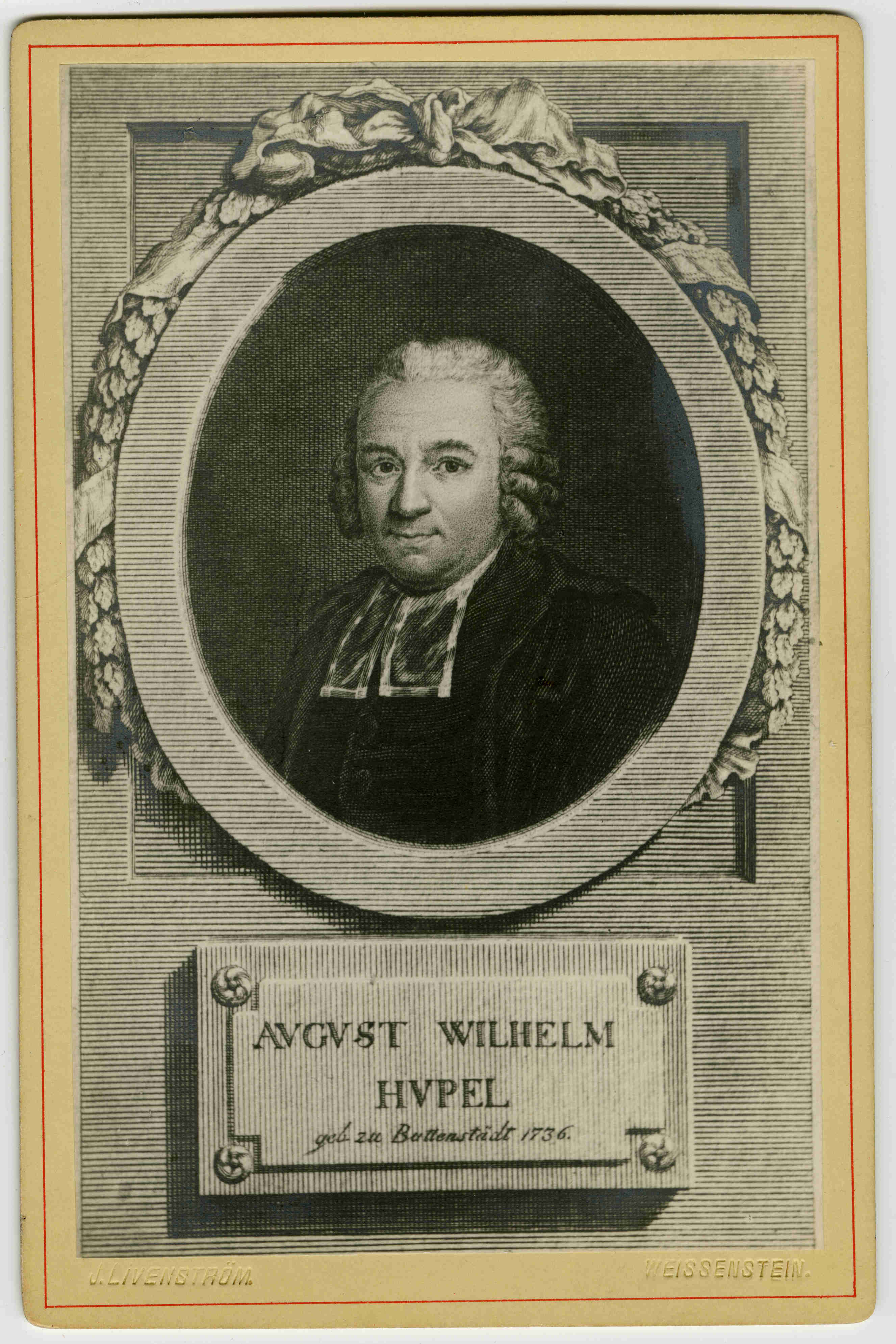
August Wilhelm Hupel
August Wilhelm Hupel (25./14. II 1737 – 07. II / 26. I 1819) was a German born theologist, linguist and enlightenment era figure. In Estonian culture, he is mainly known as the publisher of the first Estonian language magazine Lühhike Öppetus [‘A Short Teaching’].
Hupel was born in Buttelstedt in the Saxe-Weimar duchy to a pastor’s family. He studied at Weimar Gymnasium, after which he studied mostly theology at the University of Jena from 1754-1757. In 1757, he accepted the position of a home tutor somewhere in Viljandi or Tartu county. From 1758, he worked at Äksi parish. In 1760, he became the pastor of Äksi and in 1764, of Põltsamaa. The decades Hupel spent living in Põltsamaa gave him the opportunity to actively pursue sciences and publishing in addition to his clerical career. He was the organizer of a reading club for local intellectuals in Põltsamaa, which was active for more than 30 years. Hupel’s friend, a publisher and a book salesman, Johann Friedrich Hartknoch helped keep Hupel and his circle of intellectuals up to date with European culture by providing him with new literature. In 1805, Hupel relocated to Paide where he continued his clerical activity and also contributed to J. H. Rosenplänter’s magazine Beiträge zur genauern Kenntniß der ehstnischen Sprache (published from 1813-1832) that was dedicated to studying the Estonian language. Hupel is buried at Reopalu cemetery in Paide, the exact grave site remains unknown but there is a memorial stone.
As a rationalist, Hupel helped advance local education and economics and considered the Estonian peasant to have as much development potential as the Germans. Much like other enlightenment era intellectuals of the time he did not question the social system of the time. He thought very highly of the enlightened absolutism of the Russian empress Catherine the Great. He also strongly disapproved of the French Revolution.
Hupel became known as a man of letters after he translated into Estonian the popular medicine magazine Lühhike Öppetus by the Põltsamaa doctor and publisher Peter Ernst Wilde. 41 editions of the magazine were published from 1766-1767. In addition to medical advice, the magazine offered advice on farming and other practical issues, cautioned against superstition and alcoholism, etc. In 1771, Hupel translated Wilde’s other popular medicine manuscript into Estonian, entitled Arsti ramat nende juhhatamiseks, kes tahtwad többed ärra-arwada ning parrandada (‘A Doctor’s Guide to Those Who Wish to Diagnose and Heal Illness’). Despite his many Germanisms, Hupel’s Estonian was quite good, his vocabulary colloquial and nuanced. He also invented many new medical terms. In 1780, he published the Ehstnische Sprachlehre which contained both North and South Estonia grammar and an extensive dictionary (17,000 words; the updated reprint of 1819 had about 20,000 words). However, Hupel’s works on the Estonian language are not very original as they rely on the grammar book and dictionary of Anton Thor Helle. Hupel was also a collector of Estonian folk songs, six of which were also published in the second volume of the anthology Volkslieder (1779) by J. G. Herder. This makes Hupel one of the first introducers of Estonian folklore on the international arena. The songs collected by Hupel were given to Herder by the aforementioned publisher J. F. Hartknoch in Riga who was also friend of Herder and the publisher of a number of his works (including his most important Ideen zur Philosophie der Geschichte der Menschheit.)
As an author, Hupel was still most active in the German language. The four-volume Topographische Nachrichten von Lief- und Ehstland (‘Topographical notes from Livonia and Estonia’, 1774-1789) may be considered his main work. Hupel’s ‘Topography’ is an extensive work that provides a thorough overview of the nature, administrative system, economics, etc. of Livonia and Estonia, in addition to a detailed overview of the life of Estonian and Latvian peasants. In 1781, Hupel founded the magazine Nordische Miscellaneen (‘Nordic Miscellanea’), that became Neue Nordische Miscellaneen (‘New Nordic Miscellanea’) in 1792. The magazine was closed down in 1789 due to the harsher censorship laws of czar Paul I of Russia.
Hupel also wrote many works on theology, philosophy, agriculture, psychology and politics. Among other things, he also wrote hundreds of book reviews for the influential German review magazine Allgemeine Deutsche Bibliothek from 1773-1797. He contributed to other magazines as well.
S. V. (Translated by A. S.)
Works in Estonian
Journals
Lühhike öppetus mis sees monned head rohhud täeda antakse, ni hästi innimeste kui ka weiste haigusse ning wiggaduste wasto, et se kellel tarwis on, woib moista, kuida temma peab nou otsima ning mis tulleb tähhele panna igga haigusse jures. Selle körwas on weel muud head nouud, öppetussed ning maenitsussed leida, keik meie Eesti ma rahwa kassuks ning siggidusseka üllespantud. Pöltsamaa: [P. E. Wilde], 1766. [Kättesaadav: http://www.digar.ee/id/nlib-digar:120574.]
About August Wilhelm Hupel
Indrek Jürjo, Liivimaa valgustaja August Wilhelm Hupel 1737-1819. Tallinn: Riigiarhiiv, 2004, 556 lk.



